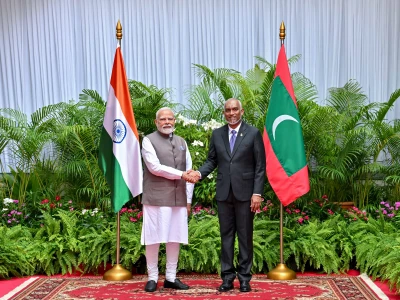
Maldives, India sign $400m, INR 30b currency swap
Maldives faces economic difficulties, with foreign exchange reserves dwindling to just $440 million.
Maldives Monetary Authority (MMA) on Monday entered into a bilateral currency swap agreement with the Reserve Bank of India (RBI)/.
This arrangement, formalised during a press briefing in New Delhi by visiting Maldivian President Mohamed Muizzu and Indian Prime Minister Narendra Modi, provides the MMA with access to a swap facility under two windows: USD/EUR and Indian Rupee (INR), against the Maldivian Rufiyaa.
According to the MMA, the agreement allows for multiple withdrawals up to a maximum limit of $400 million, as well as INR 30 billion, under the existing Framework on Currency Swap Arrangement for SAARC Countries, 2024-2027.
“The USD/EUR swap facility will support the foreign exchange liquidity requirements,” the MMA stated.
“The INR swap facility will allow trade settlement in local currency, which will further enhance and strengthen the bilateral trade between both countries.”
Meanwhile, Maldives on Monday settled a $25 million payment for its $500 million senior unsecured Sukuk.
The Sukuk was issued in 2021 and is set to mature in 2026. The payment, due semi-annually in April and October, was completed on Monday, according to the finance ministry.
President Muizzu on Sunday ruled out seeking assistance from the International Monetary Fund (IMF), expressing confidence that India will provide the financial support the island nation urgently needs.
Speaking to the BBC ahead of his five-day visit to India, Muizzu made it clear that his administration intends to pursue a "home-grown agenda" to handle the crisis, and will not join an IMF programme.
“We are not facing a sovereign debt default,” Muizzu said in an interview, dismissing concerns about the Maldives’ financial stability. He added, “We have our own home-grown agenda,” indicating that his government is determined to chart its own course to overcome the fiscal challenges.
Maldives faces economic difficulties, with foreign exchange reserves dwindling to just $440 million – enough to cover only about one and a half months of imports.
Last month, global ratings agency Moody’s downgraded the country’s credit rating, warning that the risk of default had risen sharply. According to Moody's, the Maldives faces external debt service obligations of $600 million in 2025 and more than $1 billion in 2026, far exceeding its current reserves.




